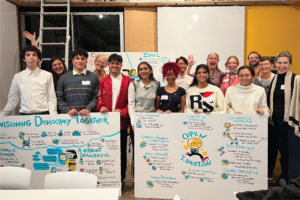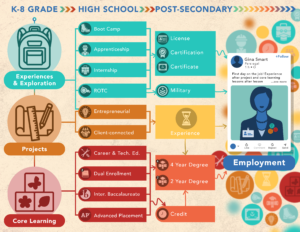Civic Education: Can Games Make the Grade?

By Victoria Van Voorhis
It has 64 squares, 32 pieces and a practically infinite set of moves.
It is likely sitting in your closet or on your coffee table. It is at once ancient – nearly 1,500 years old – and current.
It has been used across the world, and across time, to educate students about war, power, strategy, leadership, politics and civics.
It, of course, is the game of chess.
Chess is, at its heart, a teaching and learning tool, providing a mechanism for its players to explore some of the most salient concepts in civics. Like board games, video games such as Civilization, Sim City and Assassin’s Creed also delve into core civics concepts, ranging from global economics to diversity to ethical reasoning and decision-making.
If a game can be thought of as a teaching and learning tool for the field of civics, does this mean that games belong in the classroom, right alongside textbooks and lectures? To answer this question, let’s examine some of the latest recommendations for creating effective civics education. A guidebook published by the National Center for Learning and Civic Engagement provides an excellent framework for exploring this question.
Proven Practice: Provide Instruction in Government, History, Law and Democracy
At the beginning of the game-based learning (GBL) movement, many doubted the educational value of games. However, over a decade of research in GBL has demonstrated that games are a powerful way to educate, as they encourage students to experiment, learn without fear of failure and develop knowledge incrementally–all within a situated, authentic context.
Civics-specific games and simulations are also growing in number and influence. We developed Voters Ed to allow players to explore the election process, research the history and play with presidential predictions. Similarly, Mission US: For Crown or Colony and Argument Wars encourage players to become deeply immersed in civics content.
When thinking about civics, it is also important to remember the target demographic. As Justice Sandra Day O’Connor noted, “Twenty-first-century civics education must not only be more hands-on, it also must meet students where they are – and where they are is online.” Game-based learning can serve as this bridge.
Proven Practice: Encourage Students’ Participation in Simulations of Democratic Processes and Procedures
When we built Voters Ed, one of the things we heard most from the field is that student participation in democratic processes is absolutely essential. Indeed, project-based and experiential learning is known to boost student learning across all disciplines, which is why we included opportunities for this type of learning in our app. However, experts are finding that despite the need for student participation, students are far less engaged in civics than they were in the past – both due to fewer parent discussions of current events and far fewer opportunities in school to explore relevant concepts.
At the same time, today’s students are engaging socially, intellectually and collaboratively in ways that would have been inconceivable in previous generations. A recent Pew Report on teens and technology found that 92 percent of teens go online daily, with 24 percent reporting near-constant use, mostly on their phones.
It’s not just an explosion in information that drives this use, it’s also the wide variety of ways to interact with others, ranging from Snapchat and Facebook to video games. Moreover, much of this is mobile. Civics games and sims need to be too, to maximize opportunities for students to participate.
Proven Practice: Offer Extracurricular Activities That Provide Opportunities for Young People to Get Involved in Their Schools or Communities
On the surface, it may seem that this is one area where games may fall down. Playing Dungeons and Dragons or Pokemon Go can certainly strengthen or create communities, but they may not encourage the sort of civic engagement that is the goal of quality civics education.
However, game designers have thought about this one, too. A whole host of crowdsourcing games exist to allow players of all ages to make a difference in their communities. One of the most well-known of these, Foldit, developed by Zoran Popović and others at the University of Washington, allows players to solve puzzles about protein-folding. The community of players created in-games solutions that solved a research puzzle behind an AIDS-causing virus that had gone unsolved for thirteen years.
Forgotten Island and Cropland Capture are crowd-sourced games that are even more closely tied to civics, as gameplay helps researchers understand the effects of urban sprawl and identify arable land to help plan for future global food security. Players not only learn and have fun, they make a real difference.
Other games allow students to directly participate in civics by launching campaigns or participating in community projects. For example, iCivics allows students to donate game points to student service projects across the country. We anticipate that the number of games linking to community involvement will only grow as technological capabilities continue to expand.
Games and digital simulations serve as a natural extension of civics education. Through games, players can understand the dynamics of political economies and how changes in power can play out on the world stage. These games provide immersive, safe environments for exploring the connections. They boost other skills critical to effective civics education, such as critical thinking, systems thinking and complex problem-solving. From chess to Voters Ed, games and simulations invite players to experience civics for themselves in new ways, and they motivate their players to learn even more about the content.
In short, games do indeed make the grade.
For more, see:
- Game-Based Curriculum For Math Student Success
- Equity in Digital Games
- Pokémon GO: Can a Game Change the Reality of Education?
Victoria Van Voorhis is the founder and CEO of Second Avenue Learning. Follow her on Twitter: @Toryvanv
Stay in-the-know with all things EdTech and innovations in learning by signing up to receive the weekly Smart Update.






Lydia Benmouhoub
Really interesting thanks a lot